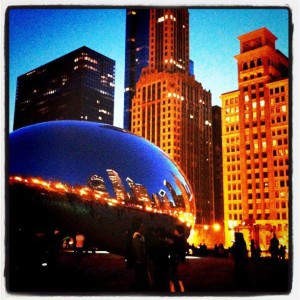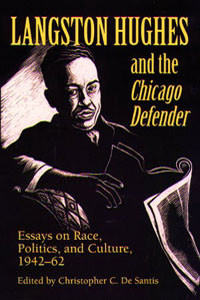 I’m not the only one. Neil Steinberg does, too. So do a lot of other people—presumably including the Rev. Jesse Jackson, who wrote of thinking to himself “God, I am in Chicago” after first arriving in the city for a visit at the age of 15.
I’m not the only one. Neil Steinberg does, too. So do a lot of other people—presumably including the Rev. Jesse Jackson, who wrote of thinking to himself “God, I am in Chicago” after first arriving in the city for a visit at the age of 15.
Steinberg recounts that moment of Jackson’s among many other stories in his 2012 book You Were Never in Chicago, which I read recently and reviewed over at Escape into Life. It’s one of many memorable tales Steinberg brings to life in the book, which took me down memory lane—both as a journalist and as an adoptive Chicagoan—while also teaching me more about the history of the city I love.
Reading the book made me think of my mom, from whom I first learned to love the city. She grew up in Chicago, the daughter of immigrants, and never really embraced rural Illinois, where she moved to raise her family after marrying my dad. Mom’s heart was always in Chicago, and perhaps it was inevitable that I would make my way to the city after college. We visited regularly when I was growing up, driving 100 miles to visit the Merchandise Mart, where my mom would scout new products for the lawn and garden furnishings business she ran from our home, or to catch the after-Christmas ornament sales at Marshall Field’s flagship store on State Street.
I still have some of the ornaments we bought together. They remind me of Mom and childhood, and those shopping excursions, and I wrap and unwrap them ever so carefully each year, knowing that to drop and break one would mean losing a precious thread that connects me to those memories.
 Steinberg’s book also reminded me of another one I’ve not yet read, but want to: The Defender, Ethan Michaeli’s history of the black newspaper that is a Chicago institution. I’ve yet to buy that one, but while I was thinking about it recently I came across Langston Hughes and the Chicago Defender, a compilation of essays that Hughes wrote over a 20-year period as a Defender columnist. Edited by Christopher C. De Santis, it’s a wonderful introduction to Hughes’ thoughts and writing on race and politics. I was struck—and a bit saddened—by how many of his observations still ring true. For example:
Steinberg’s book also reminded me of another one I’ve not yet read, but want to: The Defender, Ethan Michaeli’s history of the black newspaper that is a Chicago institution. I’ve yet to buy that one, but while I was thinking about it recently I came across Langston Hughes and the Chicago Defender, a compilation of essays that Hughes wrote over a 20-year period as a Defender columnist. Edited by Christopher C. De Santis, it’s a wonderful introduction to Hughes’ thoughts and writing on race and politics. I was struck—and a bit saddened—by how many of his observations still ring true. For example:
The Negro neighborhoods are, too often, the neighborhoods of the poor. That is why hunger, prostitution, and crime are so frequently blamed on color rather than on poverty. That is why, too, neither of the major political parties, no matter what their promises of civil rights, can really solve our problems. Our basic problems are not color, but poverty. If all of us were to turn white overnight, 90% of us would be poor whites.”
That’s from a 1948 essay titled “U.S. Likes Nazis and Franco Better than its own Negroes.” It’s just one of many passages that resonated for me.
Perhaps what I liked best about the book, though, were Hughes’ essays on art and culture. From Josephine Baker and Duke Ellington, to the everyday music of Harlem’s streets and living rooms, his writing sings the rhythm and power and beauty of the arts.
Then, through the smoke and racket of the noisy Chicago bar float Louisiana bayous, muddy old swamps, Mississippi dust and sun, cotton fields, lonesome roads, train whistles in the night, mosquitoes at dawn, and the Rural Free Delivery that never brings the right letter. All these things cry through the strings on Memphis Minnie’s electric guitar, amplified to machine proportions—a musical version of electric welders plus a rolling mill.
That passage is from “Music at Year’s End,” 1943. Read the book. You won’t be sorry.
